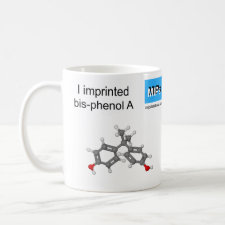
Authors: Yin WM, Wu L, Ding F, Li Q, Wang P, Li JJ, Lu ZC, Han HY
Article Title: Surface-imprinted SiO2@Ag nanoparticles for the selective detection of BPA using surface enhanced Raman scattering.
Publication date: 2018
Journal: Sensors and Actuators B: Chemical
Volume: 258
Page numbers: 566-573.
DOI: 10.1016/j.snb.2017.11.141
Alternative URL: http://www.sciencedirect.com/science/article/pii/S0925400517322724
Abstract: To circumvent the limitations of natural antibodies, receptor, or enzyme, molecular imprinting technique has received intensive attention in analytical methods Herein, based on surface enhanced Raman scattering (SERS) molecularly imprinted polymer (SERS-MIP), a SERS-MIP sensor has been developed for the sensitive and selective detection of bisphenol A (BPA). To construct the BPA sensor, raspberry-type SiO2@Ag nanoparticles (SiO2@Ag NPs) were prepared to act as supporting substrate, and BPA was adopted as template molecule, tetraethyl orthosilicate (TEOS) as functional monomer and 3-aminopropyltriethoxysilane (APTES) as cross-linker. Due to the strong plasma resonance character of Ag NPs, the SERS-MIP sensor showed good sensitivity in the detection of BPA. The core-shell and satellite-like structure of the SiO2@Ag composites could provide a large surface area for BPA recognition by molecular binding domains. In addition, the sensor could prevent interferences such as 4,4'-(Hexafluoroisopropylidene) diphenol (BPAF) and 4,4'-Dihydroxybiphenyl (DOD). Moreover, the real water samples were tested to verify the reliability and feasibility of the method. Under the optimal conditions, the proposed method behaved good analytical performance to BPA with a wide linear range from 1.75 x 10-11 to 1.75 x 10-6 M and a detection limit of 1.46 x 10-11 M
Template and target information: bisphenol A, BPA
Author keywords: surface enhanced Raman scattering, molecular imprinting, bisphenol A, SiO@Ag nanoparticles, food safety analysis



Join the Society for Molecular Imprinting

New items RSS feed
Sign-up for e-mail updates:
Choose between receiving an occasional newsletter or more frequent e-mail alerts.
Click here to go to the sign-up page.
Is your name elemental or peptidic? Enter your name and find out by clicking either of the buttons below!
Other products you may like:
 MIPdatabase
MIPdatabase









